theQuestion: Are provincial and port authorities justified in taking action to force truckers back to work?*
Picking sides is difficult in the Port Metro Vancouver truckers’ strike. Who can argue against truck drivers earning a living wage? I certainly won’t.
The strike began when non-union drivers stopped picking up and dropping off containers at port terminals. Since then, unionized truckers have joined the job action. During the past three weeks the strike has ground traffic to a near halt — with as little as 15% of the normal container traffic moving in and out.
Truck drivers are in a bind and it’s not hard to agree with their plight.
So often the pressures of squeezing every last ounce of savings out of the supply chain for the manufacture and distribution of goods means there is no cushion for the legions of small businesses operating in the system. Most truck drivers run a small business and are independently responsible for vehicle maintenance and repairs, absorbing increases in fuel costs, and covering insurance and licensing. Any change in the cost dynamic means they can go from earning a living to operating at a deficit in the blink of an eye.
Compounding the problem are delays at the port which cause drivers to wait up to four hours, leaving no time to get more than one trip in — vital to covering costs and earning a profit. Our system is organized to encourage truckers to operate as independent businesses so the system must run efficiently enough to allow them to cover costs and earn a profit or the entire supply chain breaks down.
Notwithstanding the truckers’ side, the economic consequences of allowing the strike to continue are simply far too great. Port Metro Vancouver is Canada’s largest port. Roughly $750 million worth of goods have been delayed each week during the dispute. Small businesses with goods waiting in containers are being charged storage costs of up to $455 a day. Some have already received crippling storage bills nearing $5,000.
The provincial government is set to enact legislation to force the unionized truckers back to work and PMV is threatening to terminate licenses for those non-unionized truckers who refuse to service container traffic. The provincial government and Port Metro Vancouver are not the employers in this dispute, so this action is reasonable in order to protect our nation’s economy.
However, it’s vital they also help truckers negotiate with employers to establish a fair and standard compensation in order to keep their businesses running and our economy moving.

